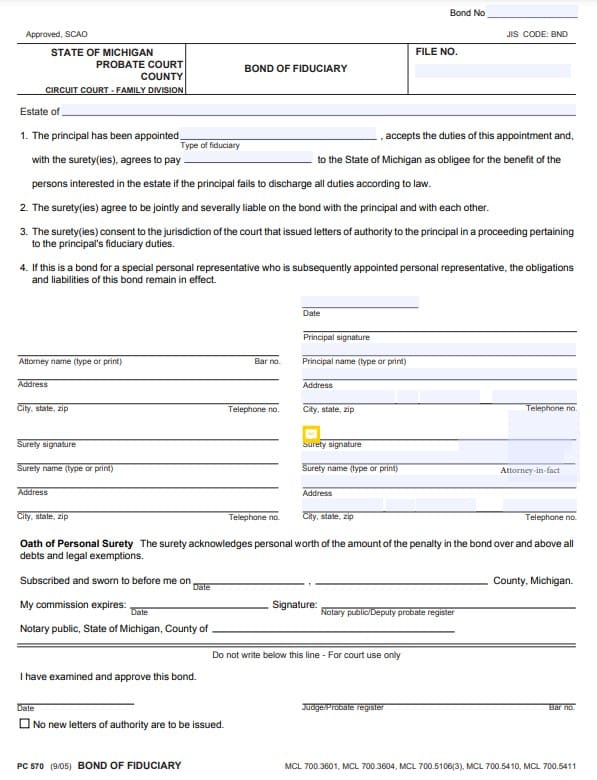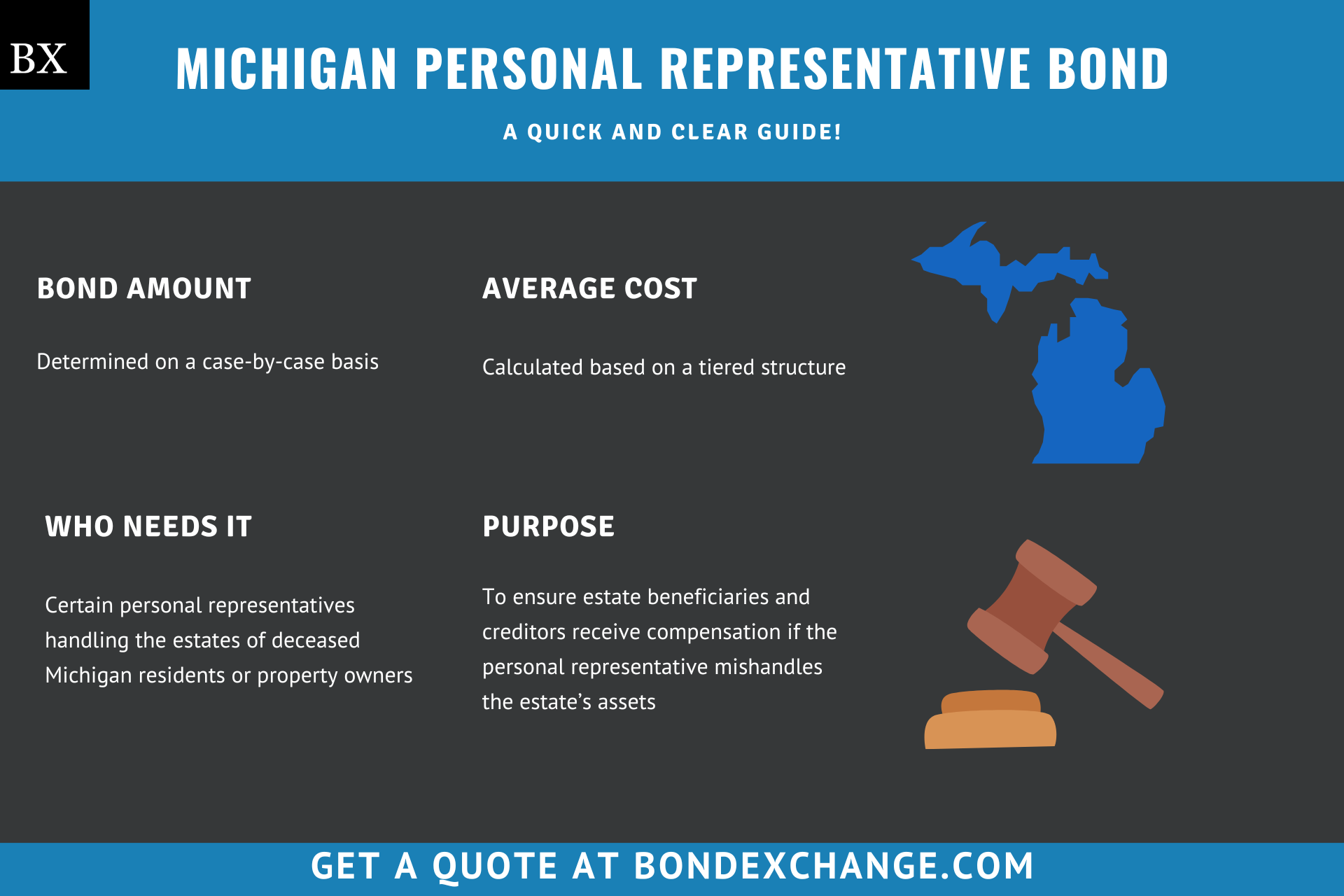Michigan Personal Representative Bond: A Comprehensive Guide
This guide provides information for insurance agents to help their customers obtain a Michigan Personal Representative bond.
At a Glance:
- Average Cost: Calculated based on a tiered structure
- Bond Amount: Determined on a case-by-case basis (more on this later)
- Who Needs it: Most personal representatives handling the estates of deceased Michigan residents or property owners
- Purpose: To ensure estate beneficiaries and creditors receive compensation if the personal representative mishandles the estate’s assets
- Who Regulates Personal Representatives in Michigan: The probate court with jurisdiction over where the deceased individual resided or had property

Background
Michigan statute 700.3103 requires all personal representatives of an estate to be appointed by a court before assuming their fiduciary duties. The Michigan legislature enacted the appointment requirement to ensure that personal representatives do not mismanage the estate’s assets. To provide financial security for the enforcement of this requirement, the court may require the personal representative to purchase a probate surety bond to be eligible for appointment.
What is the Purpose of the Michigan Personal Representative Bond?
Michigan requires personal representatives to purchase a surety bond as a prerequisite to being appointed as a fiduciary over an estate’s assets. The bond ensures that the estate’s beneficiaries and creditors will receive compensation for financial harm if the personal representative fails to abide by the regulations outlined in Michigan Statute 700.3606. Specifically, the bond protects beneficiaries and creditors if the personal representative engages in any acts of fraud or mismanages the estate’s assets. In short, the bond is a type of insurance that protects the estate’s beneficiaries and creditors if the personal representative violates their fiduciary duties.
How Can an Insurance Agent Obtain a Michigan Personal Representative Surety Bond?
BondExchange makes obtaining a Michigan Personal Representative bond easy. Simply login to your account and use our keyword search to find the “Probate” bond in our database. Don’t have a login? Gain access now and let us help you satisfy your customers’ needs. Our friendly underwriting staff is available by phone (800) 438-1162, email or chat from 7:30 AM to 7:00 PM EST to assist you.
At BondExchange, our 40 years of experience, leading technology, and access to markets ensures that we have the knowledge and resources to provide your clients with fast and friendly service whether obtaining quotes or issuing bonds.
Not an agent? Then let us pair you with one!

Click the above image to find a BX Agent near you
How is the Bond Amount Determined?
Michigan Statute 700.3604 dictates that the bond must be in the amount specified in the deceased individual’s will. If no amount was specified, the bond amount must be equal to the personal representative’s best estimate of the value of the estate’s personal property as well as the estimated income to be generated by the personal and real assets of the estate during the next year. The bond amount may be reduced by the value of any of the estate’s property that is deposited with a domestic financial institution that prevents their unauthorized disposition.
Any interested person, including the personal representative, may petition the court to increase or reduce the required bond amount.
What are the Underwriting Requirements for the Michigan Personal Representative Bond?
Most surety companies will examine the following factors when determining eligibility for the Michigan Personal Representative bond:
- Personal representative’s credit history (not considered for bonds with limits less than $25,000)
- Whether or not the estate has an attorney (not considered for bonds with limits less than $25,000)
- How long the fiduciary appointment is for
- Whether or not the personal representative is replacing a prior fiduciary
- If the personal representative has ever committed a felony
- If there are disputes among the estate’s beneficiaries
- Whether or not there is any ongoing business in the estate
- If the bond is being required by a creditor
How Much Does the Michigan Personal Representative Bond Cost?
Surety companies typically determine the premium rate for personal representative bonds based on a tiered structure. As a result, larger bond amounts will be charged a lower premium rate than smaller bonds.
The following table illustrates the pricing structure for the Michigan Personal Representative bond:
$1,500,000 Personal Representative Bond Cost
| Bond Amount | Premium Rate | Total Bond Cost |
|---|---|---|
| First $20,000 | 0.75% | $150 |
| Next $40,000 | 0.60% | $240 |
| Next $140,000 | 0.50% | $700 |
| Next $300,000 | 0.375% | $1,125 |
| Next $1,000,000 | 0.25% | $2,500 |
| Total cost of $4,715 |
Who is Required to Purchase the Michigan Personal Representative Bond?
Michigan requires personal representatives to purchase a surety bond as a prerequisite to obtaining a fiduciary appointment. To paraphrase Michigan Statute 700.1002, a personal representative is a court-appointed fiduciary responsible for administering a deceased individual’s estate. Personal representatives are referred to as executors if the deceased individual nominated them in their will (testate), and administrators if they were not nominated if no will exists (intestate). Additionally, a special personal representative is someone temporarily appointed to administer the estate while a general personal representative is in the process of being appointed.
Personal representatives are not required to purchase a bond in informal proceedings (more on this later) except in the following situations:
- They are a special personal representative
- The will requires a bond
- Any person with at least a $2,500 interest in the estate submits a written demand to the court that the personal representative purchase a bond
The court may order the personal representative to purchase a bond at any point during a formal proceeding, unless the will explicitly waives the bond requirement. However, the court may still order the personal representative to be bonded, even if the requirement has been waived by the will, if an interested person demands it.

How do Personal Representatives Become Appointed in Michigan?
Personal representatives in Michigan must navigate several steps to become court-appointed fiduciaries. Below are the general guidelines, but applicants should refer to Michigan’s probate code for details on the process.
Step 1 – Meet the Qualifications
Personal representatives are ineligible for appointment if they are:
-
- Under the age of 18
- Deemed unsuitable by the court in a formal proceeding
Step 2 – Determine Priority
Priority to serve as a personal representative is granted in the following order:
-
- Persons nominated in the will
- The surviving spouse, provided they are a devisee (entitled to real estate) of the estate
- Any other devisee
- The surviving spouse
- Any other heir
- Nominees of creditors, provided the court finds them suitable
- The state or county public administrator if no other interested person petitioned the court for appointment and if the deceased individual has been dead for at least 63 days
Any person with priority may nominate another qualified person to serve in their place. If an objection to the appointment of a specific personal representative is made in a formal proceeding, then the order of priority outlined above still stands, except in the following situations:
-
- The court may appoint any qualified person if the estate seems capable of meeting exemptions and costs of administration but incapable of discharging unsecured claims and any creditor petitions them to do so
- If any estate beneficiary objects to an appointment (other than for a person nominated in the will) the court may appoint a person that is acceptable to all devisees and is entitled to more than half the distributable value of the estate, or in the absence of such a person, any qualified person.
Step 3 – Hire an Attorney
Although not explicitly required, it is highly recommended that personal representatives hire an attorney to assist with the probate process.
Step 4 – Determine the Estate Administration Type
Michigan has four distinct estate administration types, as outlined below:
-
- Small Estate: Estates that are worth less than $25,000 (this number is adjusted yearly) and do not contain real property may be administered by simple court order.
- Informal Probate: The personal representative may administer the estate with minimal court supervision. Informal probate is overseen by a probate register as opposed to a probate judge.
- Formal Testacy: Litigation to determine the validity of a will or the appointment of a personal representative. The court is heavily involved in the administration process. Formal testacy may be requested by any interested person.
- Supervised Administration: The personal representative is closely monitored by the court when administering the estate.
Step 5 – Contact the Court
Personal representatives must contact the probate court with jurisdiction over the deceased individual’s estate. A representative of the court will walk the personal representative through the appointment process, provide them with all required forms, and answer any questions they may have.
Step 6 – Purchase a Surety Bond
Unless otherwise exempt, personal representatives must purchase and maintain a surety bond (limits outlined above).
How do Michigan Personal Representatives File Their Bonds?
Personal representatives should submit their completed bond forms, including the power of attorney, to the probate court with jurisdiction over the estate.
The surety bond requires signatures from the company that issues the bond and the personal representative. The surety company should include the following information on the bond form:
- Date the bond is signed
- Name of the deceased individual
- Type of fiduciary appointment
- Bond amount
- Legal name, address, and phone number of the entity/individual(s) buying the bond
- Surety company’s name, address, and phone number
What can Michigan Personal Representatives do to Avoid Claims Made Against Their Bonds?
To avoid claims against their bonds, personal representatives in Michigan must ensure that they:
- Do not engage in any acts of fraud
- Do not mismanage the estate’s assets
- Fulfill their fiduciary duties
